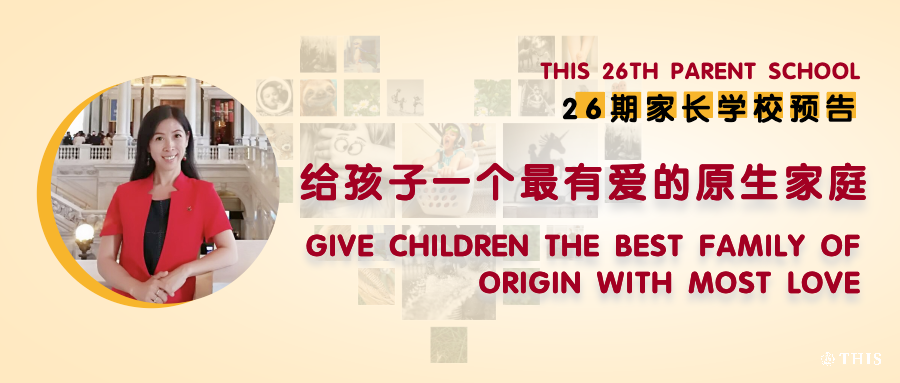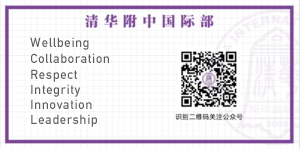
● 26th THIS Parent School ●


清华附中国际部第26期家长学校
最有爱的原生家庭助力孩子一生
How a loving family origin helps children throughout their lives
讲座回顾
Lecture Reivew

向左滑动查看英文
Swipe to the left for English version
清华附中国际部第26期家长学校于12月17日成功举办。此次讲座受到众多家长欢迎,大家汇聚线上,在世界创新教育联盟秘书长董华春博士的专业讲解中,共同学习和领悟“给孩子建设一个最有爱的原生家庭,助力孩子一生健康成长心灵丰盈”。
On December 17th, the 26th edition of THIS Parent School was successfully held and was well received by many parents. They gathered online to learn and understand from Dr. Dong Huachun, Secretary General of the World Alliance for Innovative Education, how “building a loving family origin for your child can help children grow up with a healthy hearts and souls.”


校长开场
Principal’s Opening
向左滑动查看英文
Swipe to the left for English version
讲座开始,国际部执行校长李文平女士做开场发言,感谢大家在疫情期间依然保持学习热情,为了成为更好的父母而不断努力,给孩子们树立了很好的榜样。疫情期间,家长和孩子们朝夕相处,在有限的物理空间里多了更多相伴的时间,亲子关系的温暖与否直接影响到孩子们的学习状态。嘉宾董华春博士在心理学理论和创新教育实践的基础上,结合自己多年实际经验,在如何建立最有爱的原生家庭关系上有独到见解和实际方法,一定可以帮助到大家。
Ms. Li Wenping, Executive Principal of THIS, gave an opening speech to start the seminar, thanking everyone for maintaining their enthusiasm for learning during the pandemic, working hard to become better parents, and setting a good example for their children. During this time, parents and children are spending more time together in a limited physical space. As a result, the warmth of the parent-child relationship has more direct impact and immediate affect on children’s learning than ever before.

主讲人 Lecturer
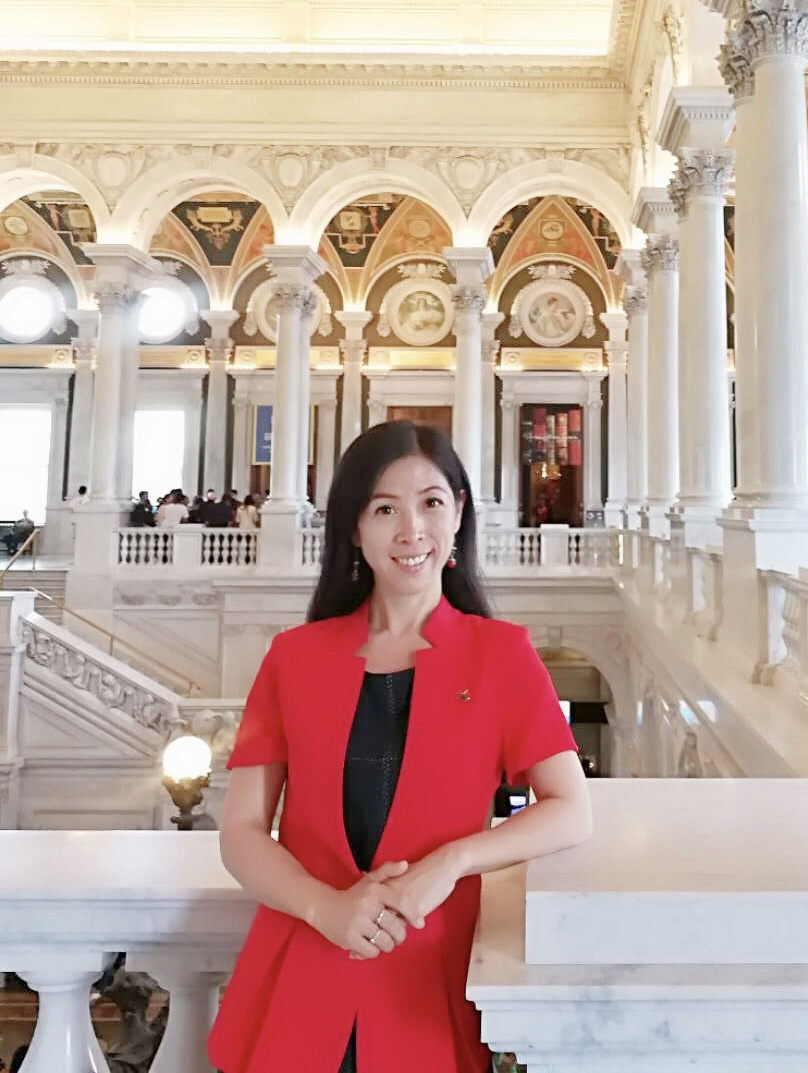
董华春 Maggie Dong
世界创新教育联盟秘书长
Secretary general, World Innovative Education Alliance.
中关村科技企业家协会副会长
Vice chair, Zhongguancun Science and Technology Entrepreneur Association
UM数字博物馆创始人
Founder of UM Metaverse Museum
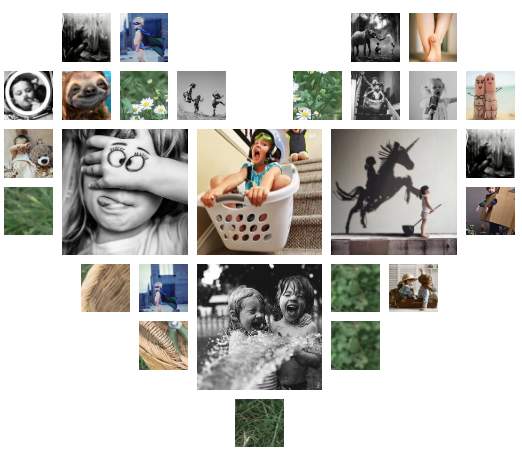

讲座回顾
Lecture Review
向左滑动查看英文
Swipe to the left for English version
董博士的讲座深入浅出,她先为大家指出,原生家庭是指自己出生和成长的家庭,即是指儿女还未成婚,仍与父母生活在一起的家庭。我们每个人在原生家庭中都经历人生成长最关键的4个阶段:
母亲体内怀胎9个月,这是我们每个人身体构造的阶段,在这里,我们身体内主要是来自遗传基因的结合和重组。
0-7岁,第一个七年,这是我们每个人初次来到这个世界,与这个物质世界接触的最开始。在这个阶段中,每个人都有自己认识这个世界方式,这种方式也深深关联着我们每个人的原生家庭和生长被养育的环境。我们生命的前七年是“我是谁”的基石,这是我们【灵商-SQ】发育的阶段。
Dr. Dong Huachun, with her many years of experience with psychological theory and innovative educational practice, shared unique insights and practical methods on how to build the most loving family origin relationship. She started by defining that the family origin is the family where one was born and raised. It is the family where and when the children are still living with their parents (before they are married). In our families of origin, we all experience the four most critical stages of growth in our lives.
Stage 1 (the 9 months from conception to birth) is the stage of our body’s construction where the combination and reorganization of genes are occuring.
Stage 2 (0-7 years) is the very beginning of each of us and our coming into contact with the material world for the first time. During this period, each person has his or her own way of knowing the world which is deeply connected to the family origin and the environment in which we were raised. These first seven years make up the cornerstone of “who I am,” the development of our spiritual quotient (SQ).

向左滑动查看英文
Swipe to the left for English version
8-14岁,第二个七年,这是我们进入青春期并发展我们主要情感模式的阶段。是我们开始了自己和他人之间的关系和边界的【情商-EQ】发育阶段。
15-21岁,第三个七年,我们开始进入年轻的成年。这是我们思考生活中的成长岁月,是我们开始产生对外界、他人世界看法的观点的时候,我们称之为【智商-IQ】发育的阶段,这是你训练你的大脑平衡和协调使用左右脑的能力,以及灵活思考和远见的能力。
The second seven years, ages 8-14 (stage 3), is when we enter adolescence and develop our primary emotional patterns. This is the stage where we begin to develop our emotional intelligence – EQ – in our relationships and boundaries with others.
At Stage 4, ages 15-21, the third seven years, we begin to enter young adulthood. These are the formative years in our thinking lives. This is the time when we begin to develop perspectives on the outside world and learn more about other people’s views of the world. This stage of development is what we call [IQ-IQ]. It is when you train your brain to use the right and left sides in a balanced and coordinated way, as well as the ability to think flexibly and with foresight.

向左滑动查看英文
Swipe to the left for English version
人的一生成长阶段彼此之间是环环相扣的。在原生家庭中,我们的SQ 、EQ、IQ是否得到了健康科学高效发展,决定了我们在这个世界上的底层模式运作是否遵循着健康的轨迹。
The stages of human growth throughout life are intertwined with each other. Whether our SQ , EQ and IQ are developed in a healthy and scientifically efficient way in what our family origin helps us to determine. Our family origins shape our underlying patterns of functioning in the world followed by giving us a healthy trajectory.
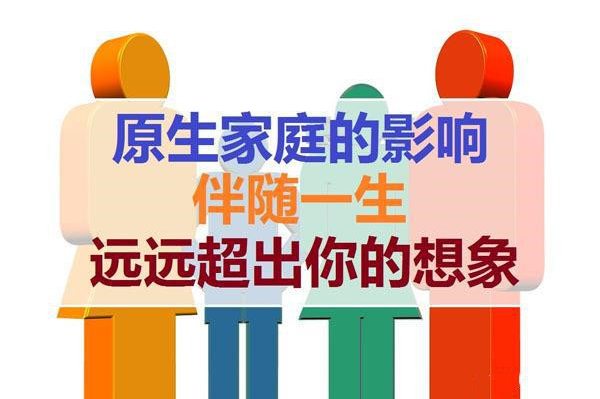
向左滑动查看英文
Swipe to the left for English version
弗里曼(David S.Freeman)在“家庭关系疗愈-原生家庭路径”“Family Therapy-The Family-of-origin Approach” 提出了的五项原生家庭的重要角色以及原生家庭对人生的六方面影响。
心理学家卡尔·荣格(Carl Jung)指出,原生家庭深刻影响着我们的内心世界的形成和发展,我们每个人的内心世界,影响我们所做的一切行为与决定,进而影响着我们成年之后的生活的方方面面。
卡尔·荣格(Carl Jung)在1940 年首次出版的《儿童原型心理学》一书中,指出所有成年人内心世界都有一个“内在小孩”(child within)。
David S. Freeman, in “Family Therapy-The Family-of-origin Approach,” identifies five important roles of the family origin and six ways in which the family origin affects life.
The psychologist Carl Jung, a proponent of the Family Origin Approach, has identified five important roles of the family origin and six areas of its influence on life. In his book “The Psychology of Child Archetypes”, first published in 1940, Carl Jung points out that all adults have an “inner child” (child within) in their inner world.
According to Carl Jung, our family origin profoundly influences the formation and development of our inner world and all the actions and decisions we make, thus influencing all aspects of our adult lives.
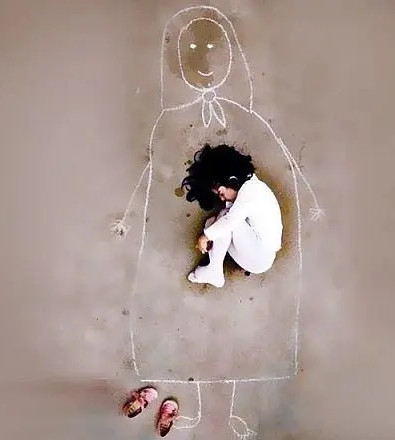
向左滑动查看英文
Swipe to the left for English version
心理学家阿德勒有句名言:“幸福的人用童年治愈一生,不幸的人用一生治愈童年。”
一个人在原生家庭中遭遇的童年创伤,很有可能会成为相伴一生的痛苦。每个人成人之后的情绪表现是和童年经历有关,意味着,当我们每个人感受到情绪受伤的时候,头脑会首先唤醒童年的某些相关的记忆,从而导致我们产生某种情绪带来的下意识行为。这些行为,目的都是自我保护(不受伤),可能是过激的反动,也可能是低迷的压抑。
The psychologist Adler famously said, “Happy people spend their lives healing from childhood; unhappy people spend their lives healing from childhood.”
The childhood trauma one experiences in one’s family origin is likely to become a lifelong pain. Each person’s emotional expression as an adult is related to childhood experiences. When each of us feels emotionally wounded, the mind first awakens certain memories associated with childhood, which leads us to certain subconscious behaviors brought on by emotions. These behaviors, all aimed at self-protection (not getting hurt), may be overly reactionary or depressed and repressed.
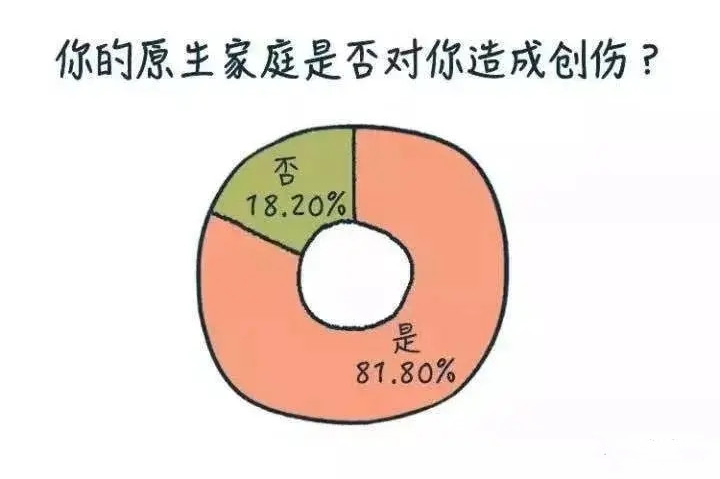

向左滑动查看英文
Swipe to the left for English version
对于孩子来说,作为父母的我们就是他们原生家庭的重要组成部分。原生家庭对孩子的影响,就如同遗传密码一样,刻在孩子的人格模式和行为模式中。在充满爱和温情的家庭中长大的孩子,人格比较健全。在缺乏爱和温情的家庭中长大的孩子,人格容易出现缺陷。原生家庭的气氛、传统习惯、子女在家庭角色上的学效对象、家人互动的关系等,都将影响孩子日后在自己人生当中以及新家庭中的种种表现。
For children, parents are an important part of their family origin. The influence of the family origin on the child is inscribed in the child’s personality and behavior pattern like a genetic code. Children who grow up in a loving and warm family tend to have a more robust personality. Children who grow up in families that lack love and affection are prone to challenges associated with personality traits. The atmosphere of the family origin, traditional habits, the role of the child in the family, and family interactions will influence how the child behaves in his or her own life and in his/her new family.
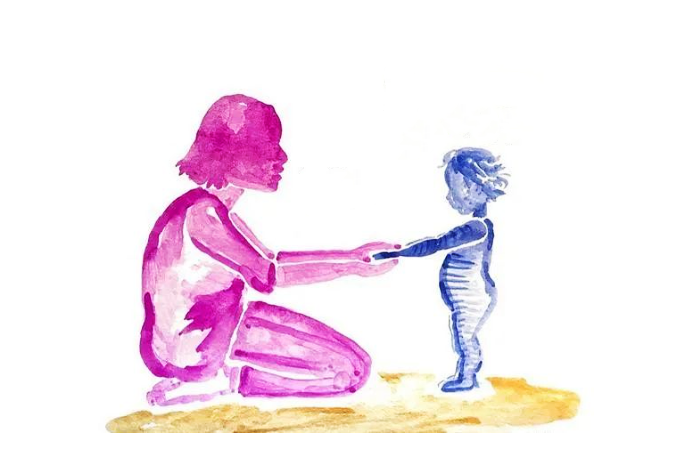
向左滑动查看英文
Swipe to the left for English version
作为父母的成年人,必须充分认识自己原生家庭的影响,勇于面对自己原生家庭的问题,和自己原生家庭和解,安抚自己内在的受伤小孩,疗愈受伤的心。因为父母所在的原生家庭让我们失去的那些,我们必须要自己找回来,才不致将原生家庭一些负面的元素带到新生家庭去。
As parents, adults must be fully aware of the influence of the family origin, face the problems of the family origin, reconcile with it to help soothe the inner-wounded children healing wounded hearts. To not bring some negative elements of our family origin to our new family, we need to get regain back what was lost to us in our parents’ family origin.

向左滑动查看英文
Swipe to the left for English version
在此基础上,作为父母的成年人,必须能够分离原生家庭的影响,超越原生家庭的桎梏,作独立而有爱的自我,有新的动力重新去爱我们的父母,有新的智慧好好去爱我们的孩子,给与孩子一个最有爱的原生家庭,培养身心健康卓越创新的孩子,和孩子共建一生爱的正能量宝库。
On this basis, parents must be able to separate the influence of their own family origins, transcend the shackles of that origin by becoming more independent and loving selves. This new motivation to love our parents again along with the new wisdom of loving our children, we, as the adults, are able to give our children the most loving family origins, raise healthy and innovative children, and build a lifelong treasure trove of positive energy with our children.

向左滑动查看英文
Swipe to the left for English version
在本次讲座中,董博士就上述内容做了系统清晰的解读,还结合著名心理学家萨提亚女士的冰山模式图为大家介绍如何更好的了解我们孩子行为之后的应对方式、感受、观点、期待、渴望、自我等,还分享了结合具体案例的“爱的十大法宝”,这些具体方法和详细话术作为实操工具,让大家获益良多。
In this lecture, Dr. Dong explained the above contents systematically and clearly. She used Ms. Satya’s, the famous psychologist, iceberg model diagram to help parents better understand what is behind or underneath our children’s behaviors – their coping styles, feelings, opinions, expectations, desires, and ego. She also shared the “ten magic words of love” with specific cases. These specific methods and detailed techniques were practical and of benefited to our parents.

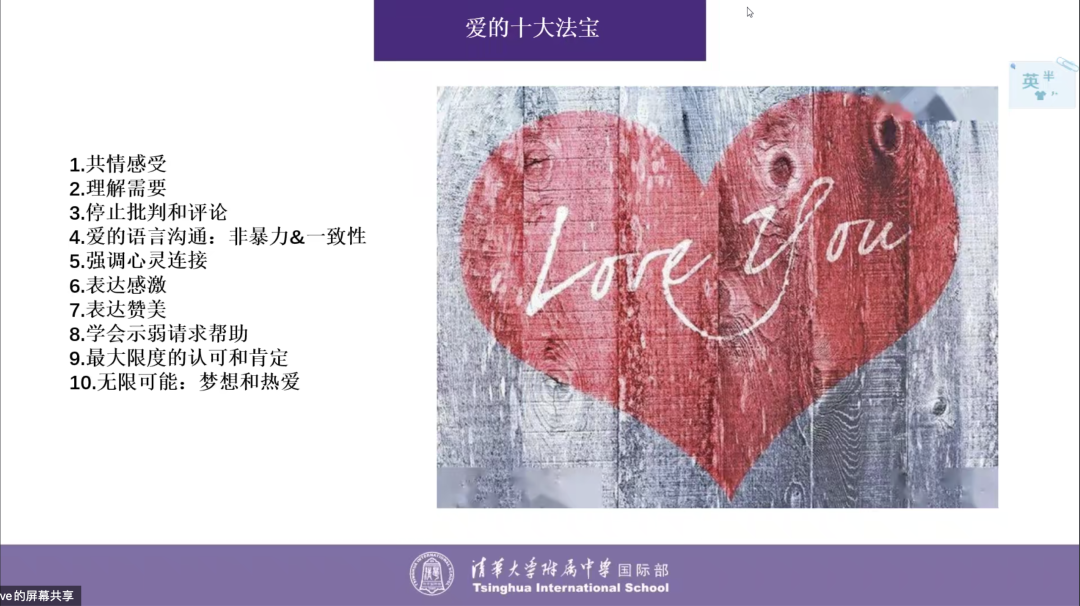
向左滑动查看英文
Swipe to the left for English version
董博士鼓励大家,作父母是世界上最伟大的事业,但需要我们每天学习和每天践行,进而才能更好地帮助我们的孩子们,更好更快的从“生物的你”和“家庭的你”成长为“教育的/社会的你”和“独立的你”,更好的发挥生命的价值和意义。
最后,董博士以纪伯伦的诗歌《论孩子》结语,祝福所有的父母们,能够和孩子一起成长,发挥生命的无限可能,因为我们的存在让这个世界更加美好光明。
Dr. Dong encouraged us that parenting is the greatest business in the world. We need to learn and practice doing it every day so that we can better help our children grow from “biological you” and “family you” to the “educational/social you” and “independent you” bringing out the value and meaning of life.
In closing, Dr. Dong recited the poem “On Children” by Kahlil Gibran, wishing all parents to grow together with their children and bring out the infinite possibilities of life. This will make the world a better and brighter place.
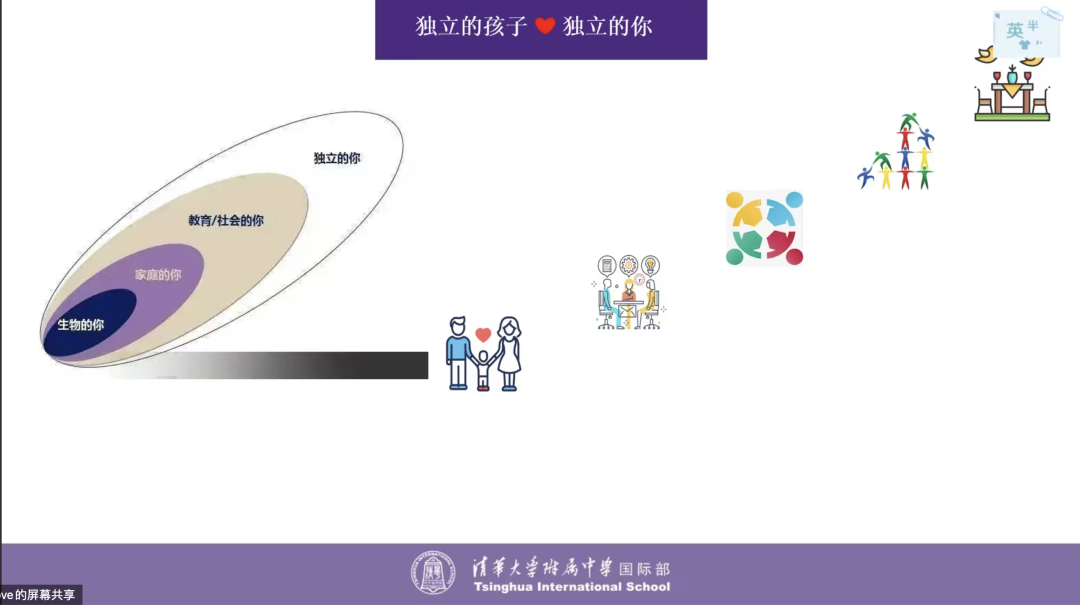
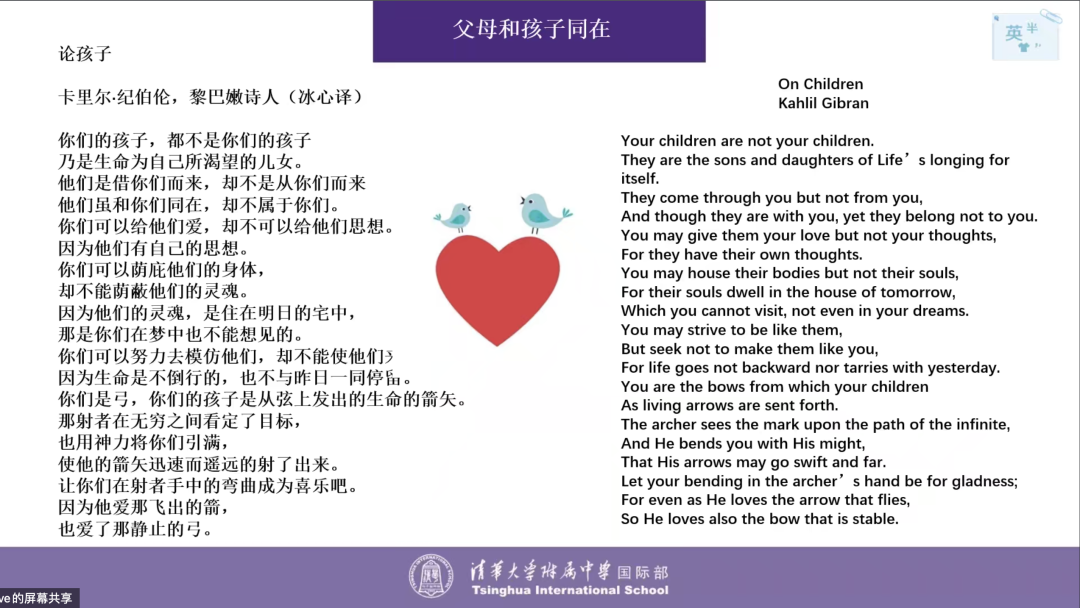

家长反馈
Parents’ Reflections
向左滑动查看英文
Swipe to the left for English version
讲座之后,在问答互动环节,董博士结合听众提出的家庭中具体案例,给出解决问题的指导性建议,给出和孩子沟通的具体方法,让听众得到及时的帮助。
听众们也纷纷分享自己在讲座中的启发和收获。
After the lecture, Dr. Dong hosted a Q&A interactive session.
The audience also shared their inspirations and gains from the lecture.

G11L Joanne’s Family
向左滑动查看英文
Swipe to the left for English version
今晚的讲座超燃、超赞,内容好,讲得棒!
听了华春主席《给孩子一个最有爱的原生家庭》讲座后,我们家进行了热烈讨论。说实在的,原生家庭不可选,是过往、是历史。但华春老师提及:往事不可追,未来还可建。我们觉得这最有道理啦,当我们有了科学的指导,有了求变的想法,有了务实的行动,一定就能朝大家预期的方向发展。我们(孩子双亲)的原生家庭,就是管生管活,成龙上天、成蛇钻草。尽管我们(孩子的原生家庭)在过去都是比较注重与孩子的沟通艺术、培养技巧,但确实存在不科学、不正确的地方。爱的十大法宝中,我们将进一步用好“理解需要、最大限度的认可和肯定”,将我们对孩子的爱,融入到日常沟通和交流的点滴,增强彼此的理解和共情,让孩子长成她自己期望的样子,我们则为国家和社会培养一个有爱心、有责任、有担当和有趣的公民!
Tonight’s lecture was super-charged and awesome, with good content and great delivery!
After listening to the President of Parent Council Hua Chun’s lecture “Giving Children the Most Loving Family of Origin”, our family had a lively discussion. Honestly, the family origin is not optional, rather it is the past and it is the history. But Dr. Hua Chun mentioned that the past cannot be traced, but the future can still be built. We think this makes the most sense. When we have scientific guidance, ideas for change, and pragmatic actions, we will definitely be able to move in the direction we all expect. Our (children’s parents’) family origins are the ones who are in charge of life and living, becoming dragons in the sky and snakes in the grass. We (the child’s family origin) in the past were more focused on the art of communication with children, nurturing skills, but this is really unscientific and incorrect. We will further use “understanding, maximum recognition and affirmation” to integrate our love for our children into our daily communication and exchanges to enhance mutual understanding and empathy. Our children can then grow up to be what they want to be as we have raised a caring, responsible and interesting citizen for our country and society!

G6L家长 Juan
向左滑动查看英文
Swipe to the left for English version
三个男娃性格迥异,如何进行有效沟通一直是做妈妈最大的挑战。听了华春老师的讲座获益良多。十大法宝每一条都很有用。而最有触动的是第三条“停止批判和评论”和第五条“强调心灵连接”。在和孩子的沟通中用到过预测性的语言,受到过孩子的挑战,今天才如醍醐灌顶,学会了怎么样才是正确的沟通方式。如何让男孩子们保持房间的整洁也一直是我无法解决的难题,而从来没有尝试过心灵连接。很感谢学校给家长提供这么好的一个学习平台。也感谢主讲老师们每一场精彩的演讲。希望疫情过后线下学校有更多的互动环节,家长们也能互相分享,共同进步。
With three boys with very different personalities, effective communication is always the biggest challenge for a mother. I benefited a lot from listening to Dr. Hua Chun’s lecture. Every one of the ten keys is very useful. The most touching is the third “stop judging and commenting” and the fifth “emphasize spiritual connection”. Having used predictive language in my communication with my children and having been challenged by them, it was an enlightening experience to learn the right way to communicate. How to keep the boys’ rooms tidy has always been a problem for me, and I have never tried to build the “spiritual connection” with the boys. I am grateful to the school for providing such a great learning platform for parents. Also, thanks to the lecturers for every great parent school lecture. I hope there will be more interactive sessions at the school in person after the epidemic and parents can share with each other and make progress together.

G1 Vincent,Jay&G5 William‘s Dad
向左滑动查看英文
Swipe to the left for English version
华春关于原生家庭的演讲很给人启发。我相信我们都知道原生家庭的重要性。但是, 1.原生家庭究竟是如何对一个人有底层的塑造作用? 2. 原生家庭对于一个人的塑造是否可以被有意识的改变迭代,从而达到对下一代更好的结果? 3. 我们是否有可能在自我主观意识下,观察和理解原生家庭的驱动力,和目前的另外一半共塑我们期待的原生家庭影响力? 这些华春都给出了一些很有启发的回答。
我和妻子最近关于原生家庭讨论很多。我们注意到一个现象,当我们在读自传的时候,一个人的自传绝大部分是在写他/她和其生命中遇到的人以及发生的故事。从这个角度讲,一个人的一生就是其和其他人所有关系的总和。这个视角让我们脱离个人看待他/她,从而获得更冷静的、脱离情绪的描述。比如,我和我的妻子讨论我的父母,不再像以前一样下结论性的定论,而是开始讨论我的父母、她的父母和他/她们那个时代的人发生的事情,以及产生的关系。这些关系越多、越密、越细节, 我们就发现,脱离了“好坏”的二元论看待我们父母带给我们的原生家庭,我们就能更平和的去看待他们的底色。在更细、更密、更细节的人与人的关系中理解父母的底色,理解自己的底色,理解爱人的底色, 是一个人的独钓寒江雪,也是和爱人的携手前行,都难,也都值得。感谢华春。
Dr. Hua Chun’s talk on the family origin was very inspiring. I believe we all know the importance of the family origin. However, 1. how does the family of origin actually have an underlying shaping effect on a person? 2. is it possible to consciously change and iterate the shaping of a person’s family of origin to achieve better results for the next generation? 3. Is it possible to observe and understand the driving force of the family of origin under our own subjective consciousness, and to co-create the desired influence of the family of origin with the current other half? These questions of mine are provided with some very enlightening answers from Dr. Hua Chun.
My wife and I have been having a lot of discussions about family origins lately. One phenomenon we’ve noticed is that when we read autobiographies. The vast majority of a person’s autobiography is about him/her and the people he/she met in his/her life and the stories that happened. From this perspective, a person’s life is the sum of all his/her relationships with other people. This perspective allows us to look at him/her outside of the individual and thus get a more calm and detached account. For example, when my wife and I discuss my parents, instead of jumping into the same conclusive conclusions as before, we begin to discuss what happened to my parents, their parents, the people of his/her time, and the relationships that arose. The more detailed these relationships became, the more we found a way to look at the family origin that our parents brought to us without the binary of “good and bad” and to look at their undertones more peacefully. In the finer, denser, and more detailed relationships between people, we understand our parents’ color, our own color, and the color of our loved ones, which is difficult and worthwhile. Thanks to Dr. Hua Chun.

G11P Martina‘s Mom
向左滑动查看英文
Swipe to the left for English version
感谢主席的分享,真的是干货满满!需要好好消化吸收,最重要是需要不断练习,把知道变成做到!正如您说的,孩子是来成就我们的,他们就像一面镜子,映射出我们的种种不堪以及伤痛,就看我们是否有勇气去面对和撕开伤疤。感恩孩子的到来,感恩主席的分享。
Thank you, Dr. Hua Chun, for the lecture. The information was well digested and absorbed. More importantly, the techniques will be practiced turning knowledge into action! As you had emphasized, our children are mirrors of our woes and hurts. Now, it’s our turn to see if we have the courage to face them and tear them open. I am so grateful for my children. Thank you for Dr. Hua Chun’s sharing.


主讲人
Lecturer
向左滑动查看英文
Swipe to the left for English version
董华春,世界创新教育联盟秘书长,欧盟中国委员会秘书长,全国青联留学人员联谊会金融投资委员会秘书长,中国亚洲经济发展协会数据与信息安全委员会执行会长,中国文化传承发展基金副秘书长,北京奉元书院执行院长,中关村科技企业家协会副会长,UM数字博物馆创始人。哈佛大学、清华大学、北京开放大学等高校特聘教授和EMBA导师和授课专家。清华大学博士后,北京大学博士,美国宾夕法尼亚大学博士,香港大学访问学者。曾任清华大学华商研究中心秘书长、华夏文化与经营管理研究所执行所长。
Maggie Dong, Secretary general of World Innovative Education Alliance,Secretary general of EU-China Commission, Secretary general of Finance and Investment Committee, Returned and Overseas Chinese Scholars Association of All-China Youth Federation (ROCSA), Chair of China-Asia Economic Development Association Data & Information Security Committee, vice Secretary general of Chinese cultural heritage and development Fund, Chair of BJ One Academy, vice chair of Zhongguancun Science and Technology Entrepreneur Association, founder of UM Metaverse Museum. Lecturer and Project Tutor, Harvard University. EMBA Tutor, Secretary general of CCES (Center for Chinese Entrepreneur Studies), Director of Chinese Culture and Management Institute, Tsinghua University. Visiting Professor, Peking Open University. Post doctor, Tsinghua University, Ph. D, Peking University, Ph. D, University of Pennsylvania, Visiting Scholar, Hongkong University.

家长学校往期回顾

第25期:走近脑科学,学会科学养育,做智慧父母
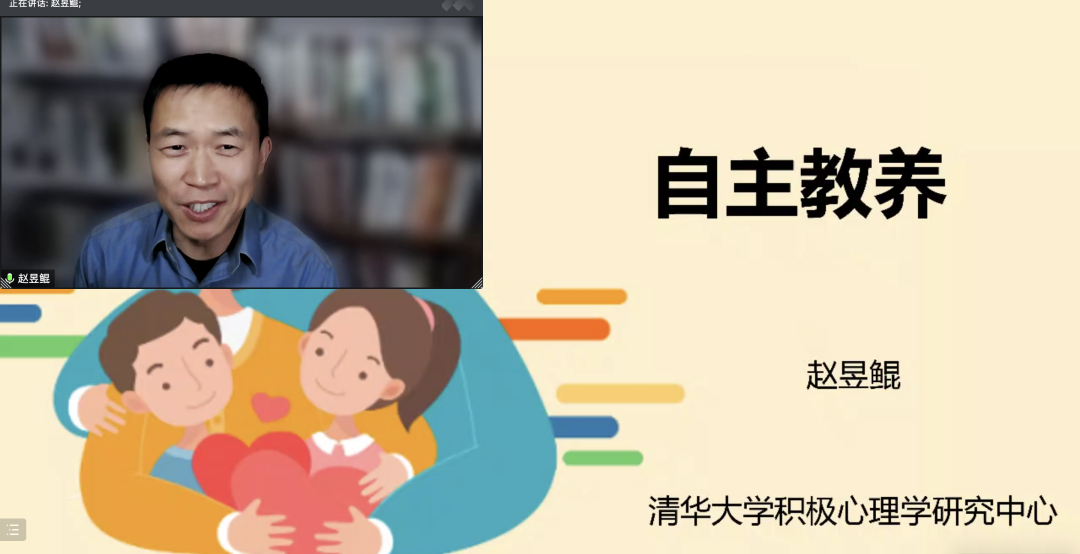
第24期:学做高手父母,以自主教养成就孩子自主人生

第23期:家有儿女上网课,心理专家来支招

文字 Writing | heart lotus
排版 Editing | Mercy Xu
审核 Auditing | Dieu-Anh Nguyen, Toni Dong, Wenping Li
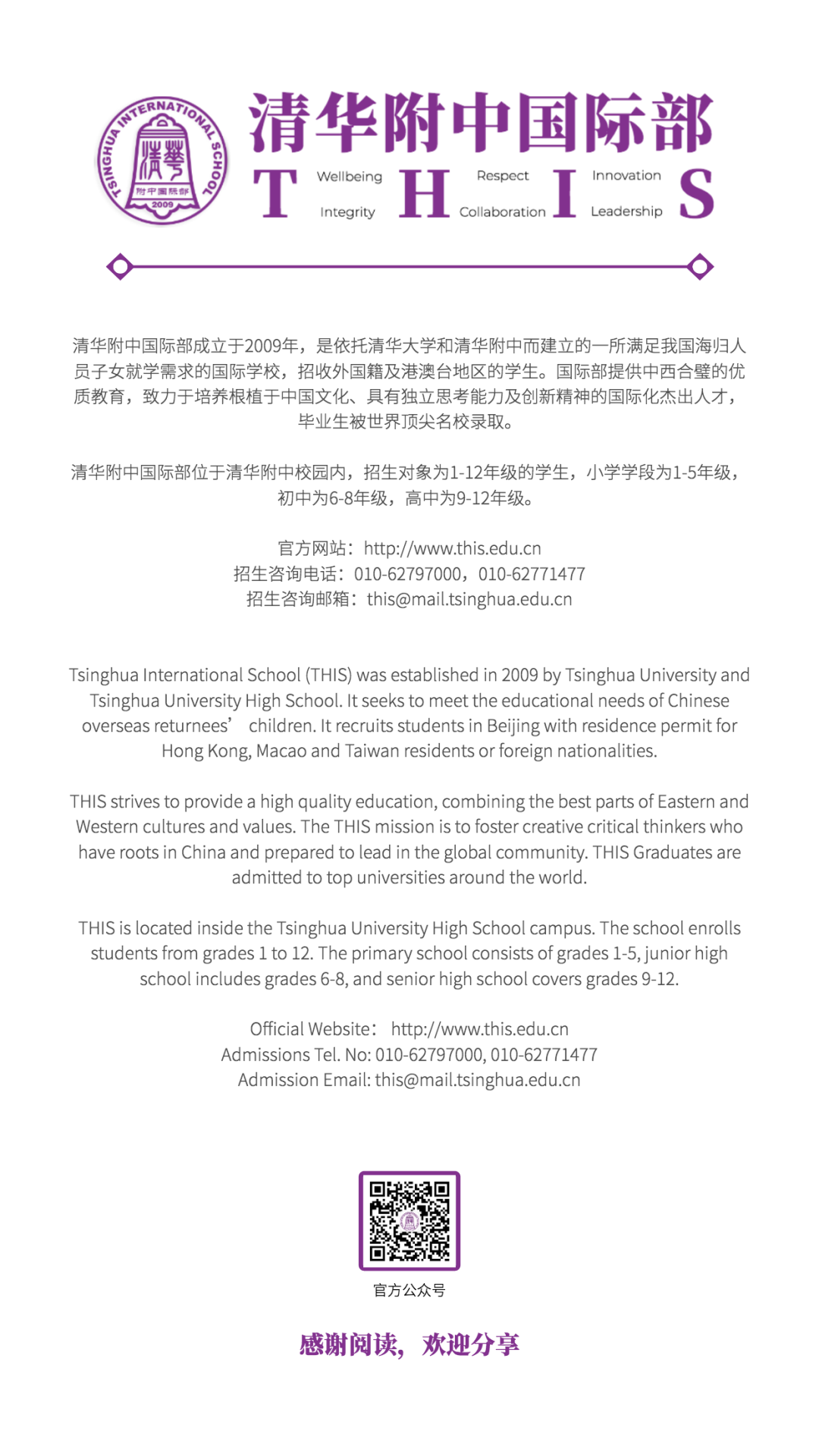
本篇文章来源于微信公众号: 清华附中国际部

